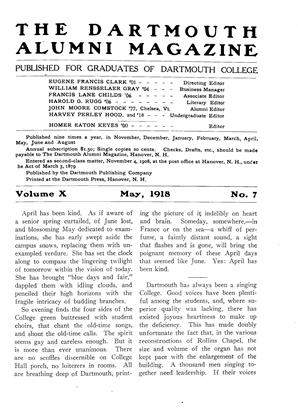and blossoming May dedicated to examinations, she has early swept aside the campus snows, replacing them with un-exampled verdure. She has set the clock along to compass the lingering twilight of tomorrow within the vision of today. She has brought "blue days and fair," dappled them with idling clouds, and penciled their high horizons with the fragile intricacy of budding branches.
So evening finds the four sides of the College green buttressed with student choirs, that chant the old-time songs, and shout the old-time calls. The spirit seems gay and careless enough. But it is more than ever unanimous. There are no scuffles discernible on College Hall porch, no loiterers in rooms. All are breathing deep of Dartmouth, printing the picture of it; indelibly on heart and brain. Someday, somewhere,—in France or on the sea—a whiff of perfume, a faintly distant sound, a sight that flashes and is gone, will bring the poignant memory of these April days that seemed like June. Yes: April has been kind.
Dartmouth has always been a singing College. Good voices have been plentiful among the students, and, where superior quality was lacking, there has existed joyous heartiness to make up the deficiency. This has made doubly unfortunate the fact that, in the various reconstructions of Rollins Chapel, the size and volume of the organ has not kept pace with the enlargement of the building. A thousand men singing together need leadership. If their voices drown the guiding instrument, they are pretty sure to become listless, discouraged, and eventually silent. The whole service suffers in consequence. It has suffered of late in Rollins Chapel.
To the generosity of the Honorable Frank Sherwin Streeter, LL.D., of the Class of 1874, is due the installation of a new instrument which, for its size, is probably unsurpassed in the State of New Hampshire. Mr. Streeter's gift is characteristic. He offered it first in the name of an "anonymous friend". Later he confessed his own sole responsibility and something of the reason for it. Law and public affairs have absorbed his active business years and crowded out some earlier concerns. Chief of these was once music and the pipe organ. In College days Mr. Streeter was, for a time, organist for Old Chapel in Dartmouth Hall. The instrument a wheezy thing, and passed into oblivion long before the Hall went up in flames. But the interest of the man who loved to play on it has endured for more than thirty years. It expresses itself today in the splendid organ whose great voice commands every corner of the new Chapel, and rouses men inevitably to worshipful song.
The train service is atrocious, of course. There will, of course, be conservation of towels in the dormitories. Hanover is, of course, still struggling with experiments in bread. The display of regal magnificence which, again, of course, usually characterizes Dartmouth Commencements will be modified as befits a time when every one who is not broke is ashamed to confess the fact. But war time economy, sack-cloth, and sense of propriety to. the contrary not-withstanding, the Almighty has not yet pulled in the Norwich hills, or veiled the exquisiteness of blossoming trees, or blotted out the violets in green grass, or dried the mirroring river, or stilled the thrush. The great round moon will burn white candles in the sky during Commencement week, and the air will be soft and sweet as freshman love.
Come therefore ye who are frazzled with affairs, worn with the confusion of the town. It will be a small Commencement, but there will be a band, and some who enjoy it. Why not be among them?
Who have been, in the past one hundred and forty-nine years of Dartmouth history, its twenty-five most potent alumni? As someone writes, "Webster publicly so overshadows others, that they have been unwittingly neglected." Perhaps that is so: but the names of Rufus Choate, Salmon. P. Chase, Thaddeus Stevens, George Ticknor and Amos Tuck come to mind almost as readily as does that of the great Daniel.
Yet these make up a total of but six. What other nineteen should be added to complete the list of twenty-five? THE MAGAZINE invites suggestions from its readers. Naturally such allowance for due perspective should be made as to permit the inclusion of deceased alumni only in such a discussion. Then, too, in extending a general invitation to the alumni to present twenty-five candidates for the Dartmouth hall of fame, no undue strain upon the modesty of any one of the contributing group should be tolerated. Hence let the list be of Dartmouth's famous dead.
 View Full Issue
View Full Issue
More From This Issue
-
 Article
ArticleHOW JUDAH DANA, DARTMOUTH 1795, WON HIS HANOVER BRIDE
May 1918 By James A. Spalding, '66¹ -
 Article
ArticleCOLLEGE NEWS
May 1918 -
 Article
ArticleMARCH MEETING OF THE TRUSTEES—EXTRACTS FROM THE MINUTES
May 1918 -
 Article
ArticleTHE COLLEGE AND UNIVERSITY PROFESSOR A RELIGIOUS PROBLEM
May 1918 By William Hamilton Wood -
 Article
ArticleLETTER FROM LIEUTENANT J. C. REDINGTON '00
May 1918 -
 Article
ArticleCAMPUS NOTES
May 1918








